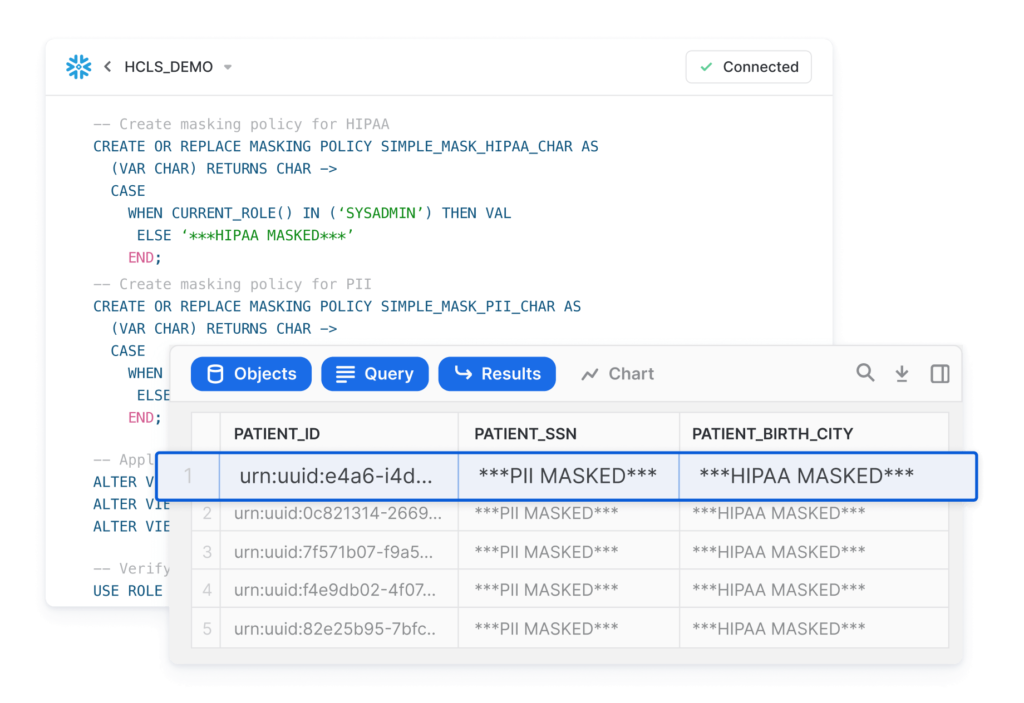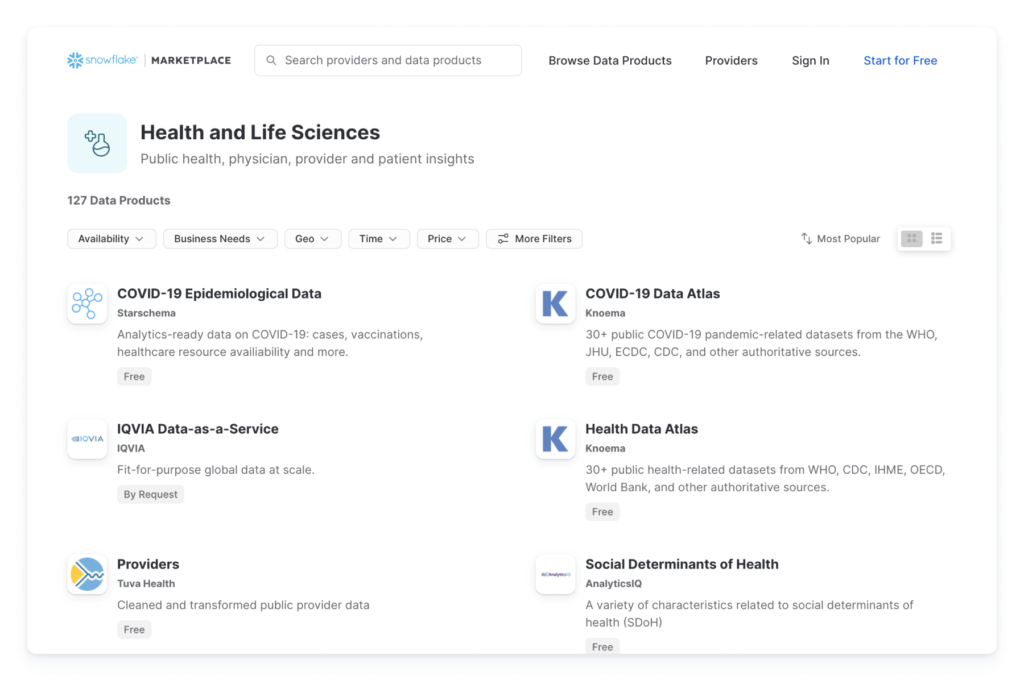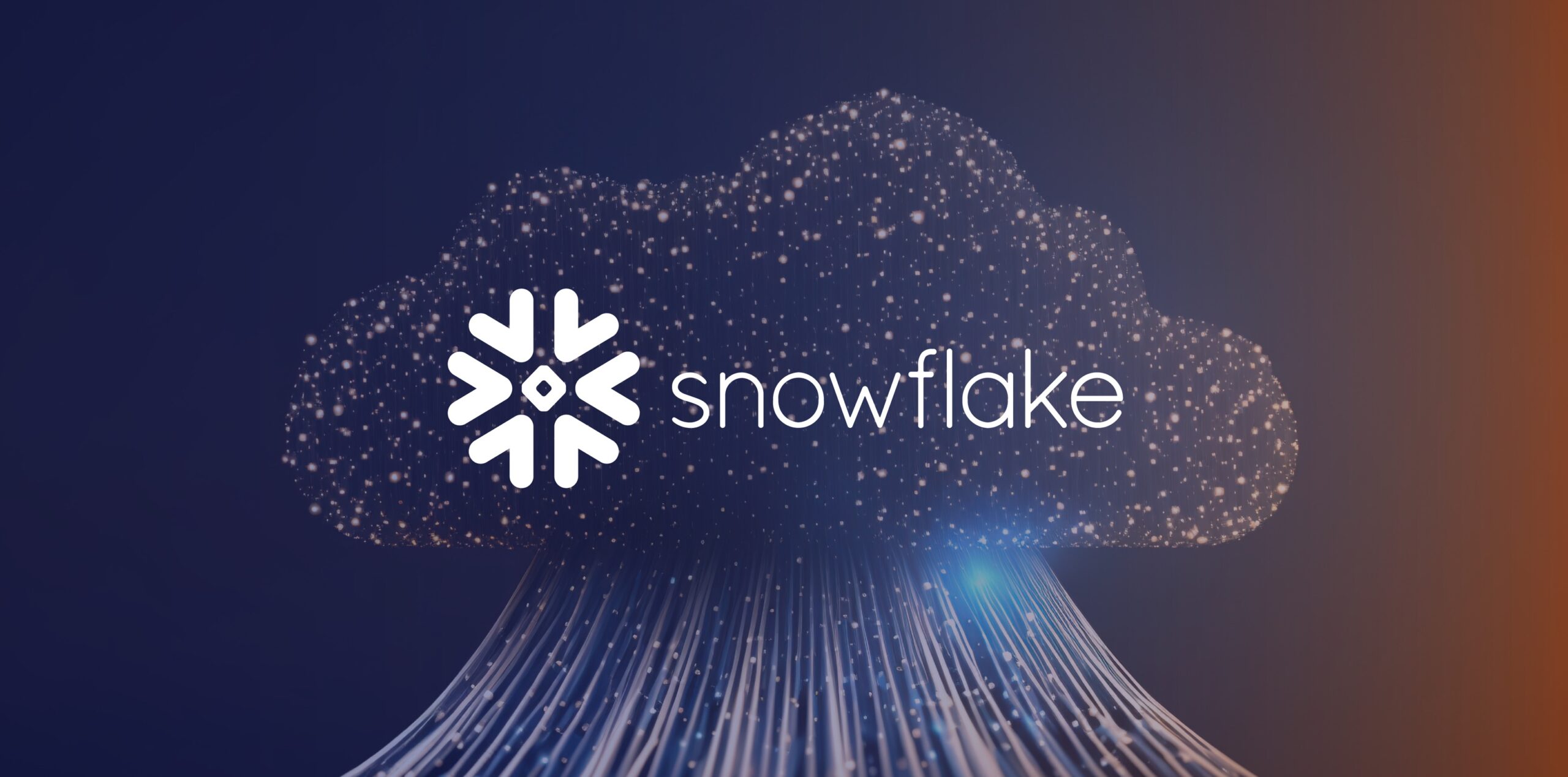The onset of the COVID-19 pandemic in February 2020 has prompted governments to realize and understand the role and need for data collaboration in ensuring efficient and effective delivery of healthcare and health equity for adults and children across the globe. However, the healthcare and health services industry face insurmountable challenges when it comes to sharing and utilizing of data.
In this blog post, we will explore the challenges of siloed data in healthcare and health services (HHS) and discuss how the Snowflake Data Cloud could potentially mitigate these obstacles.
Challenges of Siloed Data in Healthcare and Health Services
Traditionally, the healthcare and health services industry has been siloed, hindering the sharing and integration of data across different clinical, financial, and administrative departments and, consequently, preventing the holistic view of patient information. This fragmentation of data often results in the following issues:
1. Significant delays during public health emergencies
The healthcare and health services sector encounters considerable obstacles with siloed data, adversely affecting the speed and quality of response in public health emergencies.
Furthermore, insufficient integration of data sources and interdepartmental communication often delay coordinated care and public health interventions.
The COVID-19 pandemic has brought attention to significant gaps in health information systems, underscoring areas for improvement. These shortcomings have exacerbated the global impact of the crisis. These issues resulted in delays in surveilling outbreaks, identifying and tracking the disease, efficiently allocating resources to control its spread, and implementing targeted interventions in affected areas.
Addressing these challenges requires breaking down data silos, implementing standardized data collection and transmission systems, and fostering a culture of collaboration and transparency to enhance data exchange and interoperability within the healthcare ecosystem.
2. Inaccurate classification of siloed data
The improper classification of isolated data in the HHS system can hinder the provision of coordinated care, leading to gaps in patient treatment and management. One of the critical implications of inaccurate classification is the hindrance it imposes on effective communication between healthcare professionals.
The inability to access and share comprehensive patient data across various disciplines can result in fragmented care and missed opportunities for integrated interventions, which ultimately affects the quality of care delivered.
Accurate classification and integration of patient data is crucial for gaining valuable insights and making evidence-based decisions in healthcare. When data is siloed or misclassified, it can delay the identification of important trends or patterns. This can ultimately compromise patient care and hinder the advancement of a more cohesive and interconnected healthcare ecosystem.
Therefore, streamlining data classification and integration is essential to unlock the full potential of data analytics in healthcare and to improve patient care through actionable insights.
3. Difficulty making informed decisions
The fragmentation of patient data across diverse healthcare systems poses a challenge to effective communication among professionals and organizations. This fragmentation disrupts care coordination and undermines the integrity of comprehensive analytics.
Moreover, the lack of seamless information exchange impedes healthcare providers’ ability to develop a thorough understanding of patient health, medical history, and treatment options, thereby compromising the overall quality of care.
The inability to access and integrate data from various sources further hampers the proactive development of treatment plans through analytics, limiting the potential for preventing chronic conditions.
Consequently, healthcare providers encounter difficulties accessing crucial patient information during care transitions, resulting in inefficiencies and the risk of medical errors. These challenges not only impact the quality of care but also have far-reaching implications for resource allocation and patient empowerment. To address these issues, prioritizing the integration of data from different sources is essential to enable seamless, data-driven decision-making in healthcare.
Snowflake's Solutions to Combat Data Silo Complexities
1. Swift and Precise Reporting
The Snowflake Data Cloud revolutionizes reporting with its centralized platform, seamlessly storing, managing, and analyzing diverse data sources. It provides effortless access to unstructured, semi-structured, and structured data at an unparalleled scale, dismantling data silos and fostering collaboration in the healthcare industry.
Moreover, Snowflake empowers healthcare providers to optimize data architectures and leverage AI for superior health outcomes. This promotes real-time data processing, encourages collaboration, and leads to informed decisions, improved care coordination, and better inpatient treatment plans and recovery processes.
2. Seamless Data Sharing

Leveraging Snowflake, healthcare providers gain access to real-time data processing capabilities while upholding rigorous security standards to safeguard sensitive healthcare data. This commitment promotes heightened care coordination and well-informed decision-making, ultimately resulting in improved patient outcomes.
Snowflake’s facilitation of secure and efficient data sharing addresses challenges in insurance programs, public health, and disease surveillance. This holds the potential to reduce costs and enhance healthcare delivery, particularly in well-developed nations like the U.S., within Health and Human Services agencies.
3. Deliver Personalized Value-Based Care
Beyond analyzing primary data on patients, prescriptions, and outcomes, Snowflake empowers healthcare and health service enterprises to harness third-party data, which is otherwise siloed, for enhanced clinical, patient, and business insights, facilitating improved decision-making.
Integrating these external data sets with their own allows enterprises to enhance clinical trial efficiency, boost marketing return on investment (ROI), facilitate value-based care, and tailor personalized medicine.

4. Effortless Data Management
The Snowflake Data Cloud uplifts healthcare data sharing and collaboration by supporting unstructured data storage, enrichment, and insights gleaned from diverse sources.
Furthermore, in the last couple of years, Snowflake has been embraced by top companies such as Anthem, Health Catalyst, IQVIA, Komodo Health, Novartis, and Spectrum Health. It enhances decision-making, optimizes care delivery, improves patient outcomes, and accelerates clinical research.
As a data-sharing platform, Snowflake enhances healthcare delivery with ease, security, and scalability, reducing costs in insurance, public health, and disease surveillance.
5. Enhances the integrity of initiatives and programs
Snowflake plays a crucial role in securing patient access to essential resources. It also strengthens trust and transparency by clarifying how healthcare and health service programs, initiatives, policies, and operations synergize to produce favorable outcomes for the people they serve.
Additionally, Snowflake promotes collaboration among both internal and external stakeholders, thereby improving processes, pinpointing areas of improvement, and effectively managing integrity risks while ensuring patients promptly and fairly access the benefits they need.
Conclusion
In conclusion, the healthcare industry faces numerous data challenges exacerbated by the COVID-19 pandemic and siloed data systems that hinder collaboration and transparency. Snowflake Data Cloud emerges as a transformative solution, revolutionizing reporting, fostering seamless data sharing, and simplifying data management.
Snowflake’s innovative approach to data management bolsters the integrity of healthcare initiatives and programs, paving the way for improved patient outcomes.
To unlock the true power of your data and find out how Snowflake can help you, connect with our experts today!




